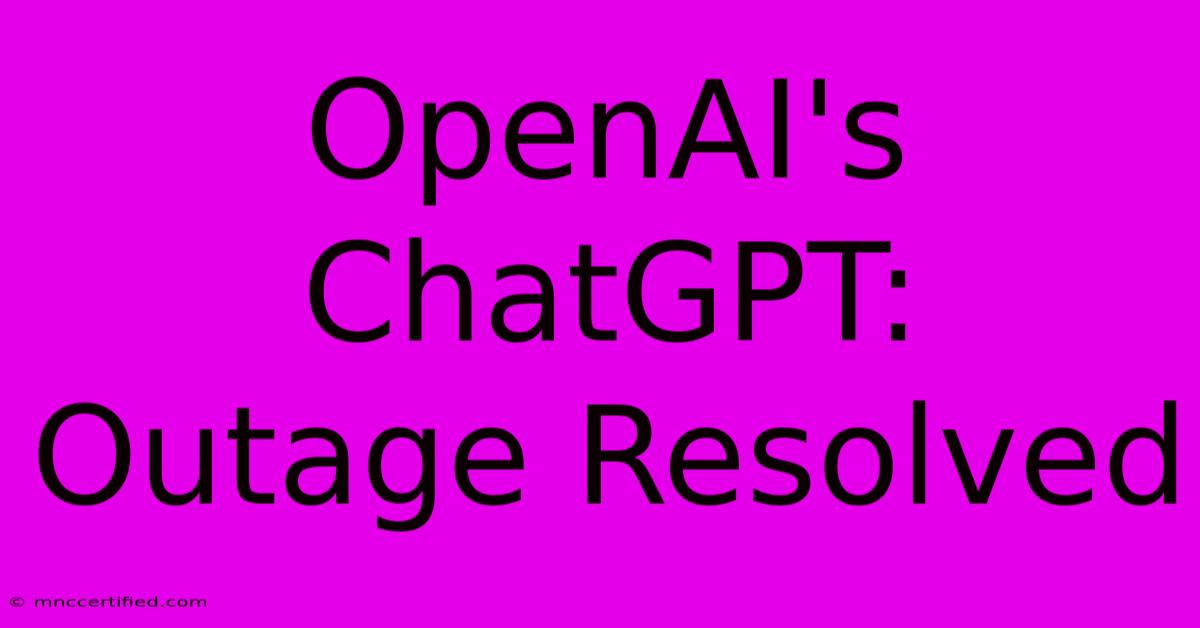OpenAI's ChatGPT: Outage Resolved

Table of Contents
OpenAI's ChatGPT: Outage Resolved – Back Online and Better Than Ever
ChatGPT, the wildly popular AI chatbot developed by OpenAI, recently experienced a significant outage, leaving millions of users unable to access the service. The disruption caused widespread frustration among students, professionals, and casual users alike, highlighting the growing reliance on this powerful language model. However, the good news is that the outage has been resolved, and ChatGPT is back online and functioning normally. This post will delve into the details of the outage, its impact, and what OpenAI has done to prevent similar issues in the future.
Understanding the ChatGPT Outage
The recent ChatGPT outage wasn't a simple hiccup; it was a significant disruption affecting global access to the platform. While OpenAI hasn't released a detailed, technical explanation of the root cause (maintaining a degree of operational security), the general consensus points to a massive surge in user demand combined with potential infrastructure limitations. The outage underscored the need for OpenAI to continue scaling its infrastructure to meet the ever-growing user base. This is a common challenge for rapidly expanding technology services.
Impact of the ChatGPT Downtime
The impact of the outage was far-reaching:
- Disrupted workflows: Many professionals rely on ChatGPT for tasks ranging from content creation and coding assistance to market research and customer service. The outage brought these workflows to a standstill.
- Educational impact: Students using ChatGPT for research or essay writing were unable to access the tool, potentially impacting their studies.
- Loss of productivity: The widespread nature of the outage led to a significant loss of productivity across various sectors.
- Negative publicity (and potential loss of trust): While temporary, any downtime for a popular service like ChatGPT can negatively impact public perception and potentially erode user trust.
OpenAI's Response and Future Improvements
OpenAI acknowledged the outage promptly and provided regular updates to users through their social media channels and status pages. This transparency, while frustrating during the downtime, helped mitigate the negative impact by demonstrating OpenAI's commitment to resolving the issue. While specific technical details remain undisclosed, it's likely that OpenAI undertook several measures to address the root cause, including:
- Infrastructure upgrades: This likely involved expanding server capacity, improving network resilience, and implementing load balancing strategies to better distribute user traffic.
- Software updates: Bug fixes and performance enhancements were probably rolled out to optimize the system's efficiency and stability.
- Improved monitoring systems: OpenAI likely strengthened its monitoring infrastructure to detect and respond more quickly to future potential issues.
Learning from the Outage: Building a More Resilient System
The ChatGPT outage served as a valuable lesson for OpenAI and the wider tech community. The incident highlighted the importance of:
- Scalability planning: Predicting and planning for periods of high demand is crucial for ensuring uninterrupted service.
- Redundancy and failover mechanisms: Having backup systems in place can minimize downtime during unexpected events.
- Transparency and communication: Openly communicating with users during an outage fosters trust and reduces negative perceptions.
- Continuous monitoring and improvement: Regularly reviewing and upgrading infrastructure and software is essential for maintaining a robust and reliable service.
Conclusion: ChatGPT's Return and the Future of AI
The resolution of the ChatGPT outage marks a return to normalcy for millions of users. However, it also serves as a reminder that even the most advanced technologies are susceptible to unforeseen challenges. OpenAI's response, while initially frustrating for users, demonstrated their commitment to resolving the issue and learning from the experience. As AI continues to evolve and integrate deeper into our lives, building robust and resilient systems will be paramount to ensuring their reliable and continued use. The experience should lead to a more robust and reliable ChatGPT in the future. This incident highlights the importance of continuous improvement and proactive measures in the rapidly evolving field of Artificial Intelligence.

Thank you for visiting our website wich cover about OpenAI's ChatGPT: Outage Resolved. We hope the information provided has been useful to you. Feel free to contact us if you have any questions or need further assistance. See you next time and dont miss to bookmark.
Featured Posts
-
Open Ais Chat Gpt Outage Resolved
Dec 27, 2024
-
Watch Newcastle Vs Aston Villa Premier League
Dec 27, 2024
-
After Christmas Sales What To Know
Dec 27, 2024
-
Seahawks Sign Player Walker Iii On Ir
Dec 27, 2024
-
Teddy Bridgewater Lions Newest Player
Dec 27, 2024